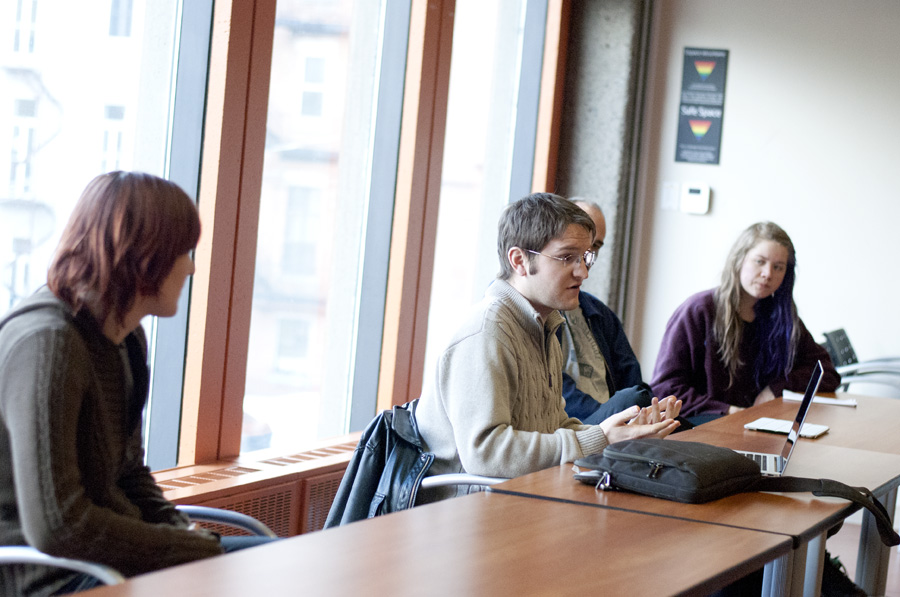Students, union members, and administrators came together to discuss the Quebec government’s announced budget cuts at a student-led Faculty of Arts forum last Thursday. Topics covered during the forum included teaching assistants’ (TA) concerns with regards to the budget cuts, and the removal of 101 arts courses for the 2013-2014 academic year.
The forum, which took place in the Madeleine Parent Room in the Students’ Society of McGill University (SSMU) Building, featured several speakers, including Dean of Students Andre Costopoulos, Jaime MacLean, president of the Association of McGill University Support Employees (AMUSE), and Justin Marleau, chair of AGSEM—McGill’s teaching union which represents TAs employed at the university.
Marleau presented first, and explained to the 30 attendees that TAs have been facing financial difficulties since 2007. Marleau said that while the university’s operating budget increased by approximately $200 million between 2007 and 2012, TAs have actually seen a 0.04 per cent decline in the revenue allocated to them. He claimed the TA funding should have increased by two million dollars.
Marleau explained that this underfunding, coupled with increased undergraduate enrollment, has resulted in a decline in the number of hours that the average TA can offer to undergraduates. He expressed concern that the Parti Québécois’ budget cuts will only worsen TAs’ financial reality.
“What we’ve heard from the administration already [is] that they’re seeking across-the-board salary freezes,” Marleau said. “A teaching assistant with a full teaching load in one semester makes about $4500 for that course. That’s not a lot of money, especially when you have to pay tuition.”
MacLean also expressed concern that, as a result of the budget cuts, the McGill administration might ask AMUSE to delay pay increases promised in collective agreements, or that AMUSE members—many of whom are students working part-time—might be at a greater risk of losing their jobs with little notice, in comparison to other McGill employees.
Marleau offered several alternative ways in which the budget cuts could be made in the next few years without hurting TAs and other unionized employees, such as cutting the salaries of senior administrators, which Marleau believes would not directly impact the quality of education and research at the university.
Following Marleau’s presentation, Costopoulos pointed to the cuts to arts courses piloted by Dean of Arts Christopher Manfredi—undertaken to get rid of low-enrollment courses—which are hoped to address the ongoing pressures felt by TAs.
“[Having] fewer very small classes … [and reducing] the size of the largest classes by distributing the students more evenly in the classes … in a sense, results in more classes for which a TA is needed,” Costopoulos explained.
Associate Dean of Arts (Academic Administration and Oversight) Gillian Lane-Mercier, who was in the audience, reinforced Costopoulos’s statement, and confirmed that TAs will receive increased funding by September.
“[Dean Manfredi] … is very adamant about wanting to increase the TA budget by this process,” she said. “We now … have the actual statistics. There will be exactly 101 less courses on the 2013-2014 offerings, and the TA budget has been upped by 16 per cent.”
Mercedes Sharpe, vice-president internal of the Anthropology Students’ Association (ASA) and co-organizer of Thursday’s forum, asked Costopoulos whether student input would be considered in the re-organization of arts courses.
“[The] Curriculum Committee, [the] Committee on Student Affairs, [and] various working groups set up by [Dean Manfredi] … are [all] part of this planning exercise,” Costopoulos responded. “Students are represented on all those bodies.”
Costopoulos encouraged participants to use their voices in university and faculty governance, and to ensure that student seats on important committees are filled.
Following the forum’s conclusion, several student participants said they were pleased by what was discussed at the event, and by what they learned from the afternoon’s discussions.
“I think it was good … to talk about how these cuts will affect labour on campus,” Sheehan Moore, vice-president publications of the ASA and co-organizer of the forum, said. “I think there is a tendency to talk about, ‘What is the student quality of life going to be?’ and … a tendency to forget that McGill employs thousands of people and that they are also [affected by the budget cuts].”
“Being able to understand the parallels between the uncertainties felt by upper administration, felt by the labourers, felt by students … to see how that’s impacting everyone, and being able to have very consistent dialogue about it, I think was very helpful,” Sharpe said.
Looking at the big picture, however, Moore said he believes there needs to be an overarching change in how consultation occurs at McGill.
“[Dean Costopoulos commented] about how … when people do talk, they are listened to. And I don’t think it’s that simple,” Moore said. “I think [that] if you have that many people saying that they don’t feel heard, then there is a culture of people—of employees and students and faculty—not being heard. And so … I would really like to see McGill making concerted efforts to change that, and not just say, ‘Look, we made a committee’ [to discuss the situation].”








